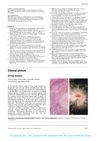Early and Midterm Outcome After Off-Pump and On-Pump Surgery in Beating Heart Against Cardioplegic Arrest Studies (BHACAS 1 and 2): A Pooled Analysis of Two Randomized Controlled Trials
April 2002
in “
The Lancet
”

TLDR Off-pump heart surgery reduces complications without affecting survival rates compared to on-pump surgery.
The document summarizes the results of the Beating Heart Against Cardioplegic Arrest Studies (BHACAS 1 and 2), which compared off-pump and on-pump coronary surgery in 401 patients. The analysis showed that off-pump surgery significantly reduced the risk of several complications, such as atrial fibrillation, chest infection, inotropic requirement, transfusion of red blood cells, and extended hospital stay. Mortality rates were slightly lower in the off-pump group (2%) compared to the on-pump group (3%), and the incidence of death or cardiac-related events was also lower (17% vs. 21%). The follow-up periods averaged 25.0 months for BHACAS 1 and 13.7 months for BHACAS 2, with no significant difference in survival estimates at 24 months between the two groups. The study concluded that off-pump coronary surgery reduces in-hospital morbidity without compromising midterm outcomes. Additionally, the document includes a clinical case of a 70-year-old woman with giant cell arteritis presenting with scalp tenderness and hair loss, treated with prednisone. The document also notes a potential conflict of interest as G D Angelini, who initiated the trial, receives royalties for a stabilizer used in off-pump operations.




